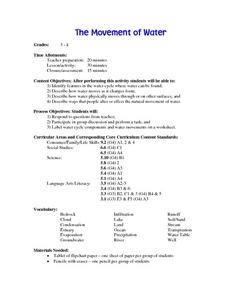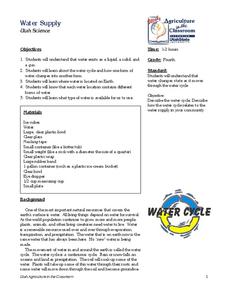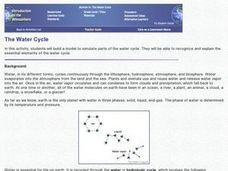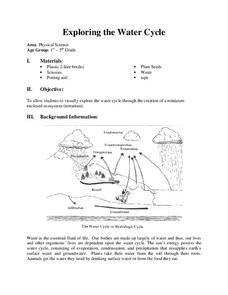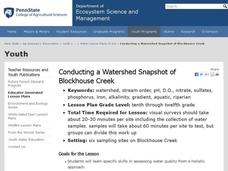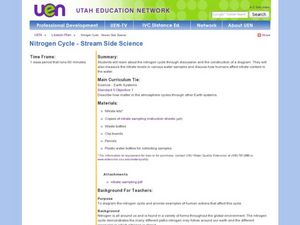Curated OER
The Movement of Water
Here is an excellent lesson plan on the water cycle and the states in which water exists. Learners identify the features of the water cycle, describe how water changes form, and look at ways that people affect the natural movement of...
Curated OER
The Water Cycle
An inventive and interesting lesson on the water cycle (and other cycles associated with it), is here for you. After doing a well-designed hands-on inquiry in class, learners also identify organisms and processes that are involved in the...
Curated OER
Water Supply
Fourth graders complete three activities. In this water supply lesson, 4th graders learn that water can exist in different forms and watch a demonstration of each form. Students explore the water cycle and make a water cycle using the...
Curated OER
Water Works Wonders
Students examine where water is found in the world, how we use it, and the various forms it takes. They observe the refraction of light through a prism, record the day and night sky over a week's time, and create a topographic model of...
Curated OER
The Water Cycle--Model Simulation
Learners build a model to simulate parts of the water cycle. They recognize and explain the essential elements of the water cycle.
Curated OER
Water Speed and Erosion
Fourth graders investigate the process of water erosion. They observe the roots of a plant and discuss the concept of erosion. Next, in small groups they conduct an experiment to observe how water erodes soil on a stream table, and...
Curated OER
Exploring the Water Cycle
Students investigate the water cycle. In this water cycle lesson, students create an ecosystem within a 2-liter bottle. Students record scientific observations as they observe the water cycle within their ecosystem.
Curated OER
The Water Cycle
Fifth graders identify organisms and processes involved in three cycles: the water cycle, the carbon cycle, and the nitrogen cycle. They produce a pictorial or abstract water cycle, and appropriately place life forms onto an existing...
Curated OER
Water Cycle
Students identify the different stages in the water cycle. In this earth science lesson, students calculate the residence time of water in oceans using a mathematical formula. They explain how this cycle regulates the Earth's climate.
Curated OER
Pollution
Young ecologists investigate some of the many ways that human activities adversely affect the environment. After identifying the main types of pollution (air, water, soil), 3rd graders fill in a Venn Diagram by pasting cut-out pictures...
Curated OER
It's Raining, It's Pouring: The Water Cycle
Students investigate the relationship of the steps in the water cycle, and create a simulation of the water cycle in a jar.
Curated OER
Properties of Fresh and Sea Water
Students work with three stations to demonstrate the properties of water. They explore water's boiling point, freezing point, and its ability to store heat.
Curated OER
Water, Water, Everywhere and Always on the Move
Pupils create their own water cycle in a terrarium. In this water cycle lesson, students research the water cycle and complete a worksheet using the Internet. They create a water cycle of their own in a jar with stones, sand, soil, and...
National Park Service
Glaciers and Water
Explore the amazing power of glaciers with a hands-on earth science experiment! After first learning basic background information, learners go on to create their very own chunks of frozen water and gravel in order to...
Curated OER
"Conducting a Watershed Snapshot of Blockhouse Creek"
Young scholars examine specific skills in assessing water quality from a holistic approach. They assess the health of a local watershed and identify problems in the local watershed and suggest remediation.
Curated OER
FOLLOW THAT WATER
Learners build simple stream tables and vary the angle of the stream tables in order to simulate different flow rates and compare the results. They observe various features formed in a stream table by flowing water and compare these to...
Curated OER
Science Investigation Using Water Quality
Eighth graders conduct an experiment that analyzes the physical and chemical characteristics of various water samples. They discuss the procedures and safety concerns for the water test, and test their water samples to determine if they...
Curated OER
Water, Water Everywhere
Students study the location of Earth's water and study the water cycle using a terrarium. In this water study lesson, students study a model globe for the Earth and find Alaska. Students locate the bodies of water and study an overhead...
Curated OER
The Water Cycle: A Repeating Pattern in Nature
Students are introduced to the terms related to the water cycle in their native language. In groups, they describe the steps of the cycle using different materials found in their art classroom. They describe how energy helps water...
Curated OER
Air and Water in the Environment
Students demonstrate an awareness of air as a substance that surrounds us and takes up space, and whose movement we feel as wind. They predict and describe how local weather conditions affect living things, including themselves.
Curated OER
Land Use Issues
Students examine soil types and determine the ability of each to absorb water. Working in groups, they time how long it takes for water to seep out the bottom of the cups. They examine soil components, conservation, erosion, and tree...
Curated OER
Rain On
Fourth graders study the water cycle and clouds. In this water cycle and cloud lesson, 4th graders determine the definition of condensation and watch a demonstration in which the teacher makes a cloud in a bottle. They discuss the water...
Curated OER
Nitrogen Cycle-Stream Side Science
A thorough background and nitrate sampling lab sheet are provided to share with your young scientists. After discussing the nitrogen cycle with the class, you will break them into small groups and show them how to use their inquiry...
Curated OER
How Does Flowing Water Shape a Planet's Surface?
Students investigate how flowing water influence landforms. In this earth science lesson, students observe water behavior as it flows from the stream table at various inclinations. They discuss whether water shaped Mars landforms or not.
